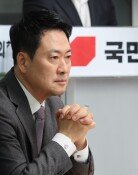[Editorial] FKI Needs to Stay Away From Government
[Editorial] FKI Needs to Stay Away From Government
Posted April. 08, 2005 23:38,
The cooperative efforts by the government and the Federation of Korean Industries (FKI) to boost the economy are surely desirable. However, there are times that the FKI needs to speak out loudly for a more active market economy and improved company environment. If the FKI is too susceptible to the intentions of the government and therefore fails to represent the companys difficulties properly, chances to stop the governments failure will be harder to grab.
The federations standing vice chairman, Cho Kun-ho, a former vice minister of science and technology, said on April 7 that there is more to lose than gain when confronting the government. Cho said that companies have to persuade the government and work with it. This is understandable. However, the economic circle has argued that the FKI will be nothing more than a quasi-government agency if it remains agreeable to government policies. It is necessary to take the argument seriously. The FKI addressing its opinions clearly can prevent the government from making wrong judgments while making policies.
The FKI recently let go Jwa Sung-hee, the president of the Korean Economic Research Institute (KERI), who emphasized growth priority and criticized the leftist tendency of the economic policies. Ha Dong-man, former commissioner of the Korean Intellectual Property Office, was appointed as the new secretary-general of the federation afterwards. Considering that he was working for the government until recently, Im wondering how clearly he will be able to speak out to the government, representing the companies.
For the past years, the FKI has made a lot of accomplishments for the improvement of companies and the market environment, overcoming its limitations as a mere interest group. It had been a target of criticism when unlawful transactions it made with the political circle during the power transition were revealed. However, the nations current advance is credited to its driving force through the strategy of choice and focus. Since the beginning of the Roh Moo-hyun administration, the federation has served to spread positive recognition about companies roles and has also criticized anti-market polices for the realization of free democracy and the strong infrastructure of our market economy.
Perhaps, a good lesson can be learned from the Japanese Business Federation as a group that collects the opinions of companies and sends them to the government. If the roles of the FKI are confined to remain only as an addressee of the government policies, the future of the Korean economy will be gloomy. The FKI, by more actively serving as a sound guardian, has to contribute to economic progress and job creation.




![“잠만 자면 입이 바싹바싹”…잠들기 전에 이것 체크해야 [알쓸톡]](https://dimg.donga.com/c/138/175/90/1/wps/NEWS/IMAGE/2026/02/23/133404749.3.jpg)


